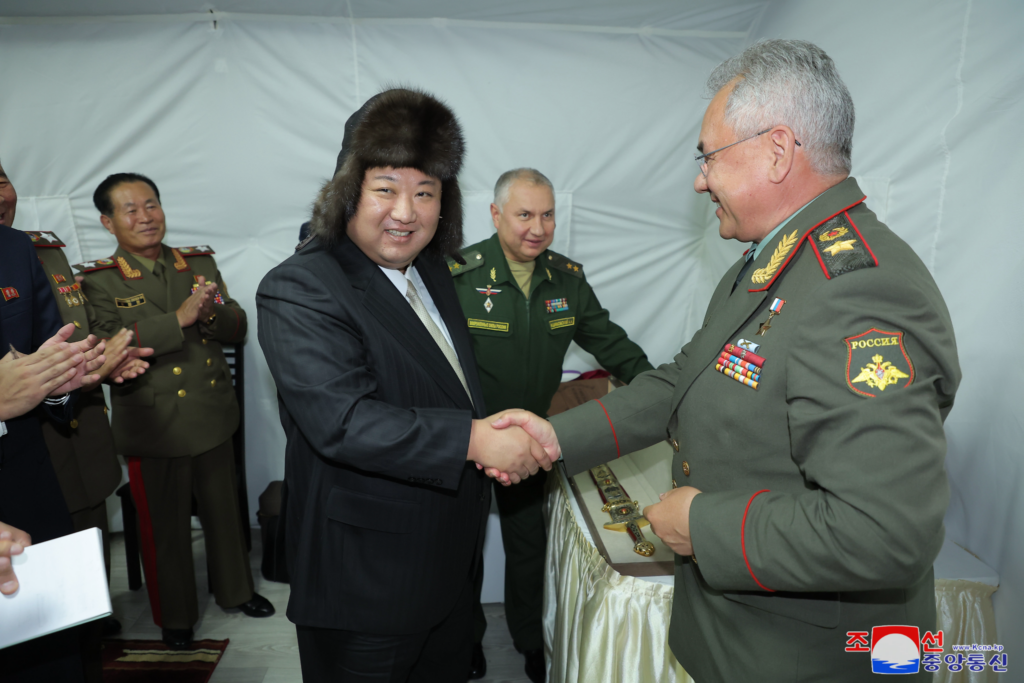Tensions on the Korean Peninsula have not been this high since 2017, when then US president Donald Trump and North Korean Supreme Leader Kim Jong-un exchanged threats of nuclear war and North Korea tested its first long-range missile capable of reaching the United States.
On 16 January 2024, Kim ordered a change to the country’s constitution — a document of unclear utility in an Orwellian personality cult — so that peaceful unification of North and South Korea was stricken from official policy. Party officials must also eliminate or downsize agencies and organisations related to inter-Korean relations, pointing to long-term institutional changes to all inter-Korean issues.
Kim’s explicit rejection of unification marks an important shift in how the regime talks about and publicly presents the future of the two Koreas. But in practice, North Korea’s ideas of what ‘peaceful’ unification with the South would mean lost touch with reality a long time ago.
The conventional Pyongyang idea of unification means the collapse of the South Korean state and a Kim Jong-un-led government from Jeju Island to Sinuiju. Even a confederation, as loosely defined as it has been up to now, would require permanently expelling US and UN Sending State forces — including personnel from key US allies such as Australia, Canada and the United Kingdom — from the peninsula and somehow forging permanent connective tissue between illiberal totalitarianism and robust democracy.
The reconciliation of free and fair elections in some territories and state-approved pro-Kim ballots in others, or the reach and scope of South Korean corporate governance in a country that does not recognise private enterprise, is impossible. A confederation that is nothing more than regular cash and resource transfers from South to North without sanctions restrictions may be the closest thing to a realistic confederation, but that is extremely far-fetched even during periods of detente.
North Korea now regards South Korea as a hostile separate country. Kim has taken steps to reinforce this position, including ripping up the 2018 Comprehensive Military Agreement he signed with then South Korean president Moon Jae-in to reduce military activity at the border.
In the agreement’s absence, the North Korean army resumed artillery drills so close to South Korean territory that border residents were forced to evacuate their homes. State media regularly promotes new short-range ballistic weapons capabilities that Pyongyang says are aimed at US and South Korean forces.
North Korea also keeps lowering the threshold for nuclear weapons use. Not only does it now consider nuclear weapons appropriate for pre-emptive strikes, but even the routine deployment of military assets to South Korea may be enough to convince Kim Jong-un to fire missiles at South Korea and elsewhere.
South Korean President Yoon Suk-yeol’s administration is seemingly doing all it can to fan the flames. Yoon and his officials regularly encourage frontline troops to shoot first and ask questions later. The South Korean Ministry of Unification is downsizing under the command of the John Bolton-esque North Korea hawk Kim Yung-ho. While Seoul has rightfully elevated North Korea’s human rights issues, it has otherwise expressed little creativity in proposed inter-Korean policies that it is likely Yoon is not actually that interested in changing the status quo.
None of the above suggests war is likely to break out anytime soon, nor is North Korea’s rhetoric and behaviour particularly anomalous. Yoon might be the most pro-US president elected to office and will not act unilaterally during a serious contingency, while the White House is almost as uninterested in North Korea as Yoon’s presidential office.
More importantly, the Kim regime has never harboured a realistic strategy for unification — regularly threatening violence against the United States and its allies, including nuclear annihilation, and spending enormous resources on the military. Past periods of detente, such as the ‘Sunshine’ and ‘Moonshine’ eras in the early 2000s and late 2010s, were exceptions to the rule.
Two important variables introduce some level of uncertainty. First, North Korea has more support than ever before from China and Russia, who are eager to undermine Western leadership wherever possible. Both have shielded Pyongyang from punitive action at the United Nations, allowing the regime a free hand to test new and stronger nuclear-capable weapons. Russia has few friends and will need North Korean missiles and other weapons for as long as it presses its imperial ambitions against Ukraine.
Kim Jong-un may feel emboldened by this new manoeuvrability to engage in ever greater provocations, including attacks on South Korean targets as have occurred in the past. His apparent disenchantment from nuclear talks in 2018 and 2019 convinced him to never give up his nuclear weapons.
The second variable injecting a level of uncertainty is the prospect that Donald Trump returns to the White House. His extortionary tactics toward South Korea and obsession with retrenchment of US military forces generated disdain in Seoul and fuelled robust discussion about the merits of a South Korean nuclear deterrent — a major threat to global proliferation norms that was unheard of just a few years ago.
Trump will either once again fall ‘in love’ with Kim Jong-un and be willing to throw South Korea under the bus, return to the ‘fire and fury’ rhetoric that marked the first year of his presidency, or both. This level of uncertainty could wreak the most havoc on the Korean Peninsula in 2024.
Arius M Derr is a PhD candidate in the Coral Bell School of Asia Pacific Affairs at the Australian National University.

